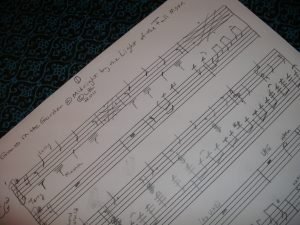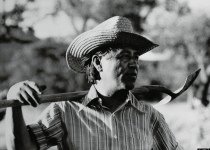Like many others, I feel at a loss to shape words into coherent phrases expressing outrage, sorrow, compassion and balanced thinking in the midst of our current flood of events in today’s world.
In light of this, as always, my medium of choice is music…and music as protest/social statement has a long history. Yes indeed I, myself, did the singer-songwriter scene in my early adulthood. Coming of age in the midst of another time of social unrest – I still embrace that genre.
Life goes on and in today’s world, my own current brand of compositional expression tends towards instrumental music. Personally, I feel it allows for individual interpretation, un-dictated by lyrical suggestion.
Which leads me to Max Richter, a favorite contemporary composer of mine.
Some time ago I stumbled upon an interview-article with Max published on Fifteen Questions. This on-line journal engages “production experts, performers, journalists, scientists and composers to discuss what music means, how it’s made, where its limits lie, and why it affects us all so differently and yet remains universal” rather than discussing the private lives of artists or their latest releases.
Here are a few of his thoughts to which I relate and are relevant to the subject of this blog post. I encourage those of you interested in musical composition and the driving forces behind it to read the full interview.
Max Richter – interview excerpts and short musical clip
Recomposed: Vivaldi’s Four Seasons (Spring)
What do you usually start with when composing?
Music for me is storytelling, so I usually start with an intention or something I want to say. From there I kind of struggle around in the dark, trying to find ways to say that. Sometimes it’s a linear thing where I have an idea and then go about trying to find ways to express it. Other times I will discover things along the way and the idea ends up turning into something else altogether. It’s a mixture between intention and chance.
I think the reason I write music is because I’m trying to say things that I find difficult to encapsulate verbally. Music is its own kind of language and it’s very good at saying things that words struggle with, so that’s often the impulse for me.
The role of the composer has always been subject to change. What’s your view on the (e.g. political/social/creative) tasks of composers today and how do you try to meet these goals in your work?
Music is a social art, kind of like talking, but in a way, music as a vehicle for political critique has evaporated in the last 20 years and that’s disappointing.
I think if we’re talking about something in music, we should be talking about the big things that are worth talking about and those things are: the state of the world; how we live and how we spend our time. That’s something that really drives me. For example, the track The Shadow Journal on Blue Notebooks, for me, is a protest song. It was composed and recorded the week after the first big anti-Iraq war march in London. And even though Czeslaw Milosz’s words are actually describing the Second World War, the imagery he used resonated with me at that particular moment in time and so social comment was most definitely the primary motivation behind this piece of music.
Generally speaking though, people are not thinking about music in those terms anymore, not if you compare it to the counter-culture movement of the sixties, when social commentary was one the absolute driving forces of music. It’s a shame and a lost opportunity in many ways.
Herbie (and the Headhunters) Hancock – interview excerpts and musical clip
And then there’s Herbie. Rummaging through some of my paper files a few weeks ago, I came across a Music and Musicians (June 2010) article I kept on hand entitled, “Herbie Hancock: Imagining the future with a plan, a piano and a vision of peace.”
I first heard of him as Herbie and the Headhunters in 1973 during my second year of college (University of Colorado at Boulder, 1972-1977). I fell in love with his ‘new’ funk sound while listening to his Chameleon on the then ‘underground’ Denver radio station KLZ FM.
Give the piece a listen as you continue reading excerpts from that article.
What did you set out to do with this (The Imagine Project) record?
I wanted to make a global record. Although I’ve recorded with artists from other countries at various times, this truly was about emphasizing global collaboration as a path toward peace. I started thinking about America basically being an immigrant country.
Most of us have ancestors who were not from these shores. So we have these issues that are happening now about immigration and closing the borders and locking things down. I understand the motivation – the fear from 9/11 and terrorists. If you couple that with the insecurity that has come about because of the economic downturn, it’s drawing people into a state of chaos.
They’re trying to find ways to blame something, to put it on somebody. I think it’s time to stop looking outside for who to blame…now is the time to proactively begin the process of creating the kind of future we want for our children and for our children’s children.
How did you translate those ideals into music?
The first thing you have to do is be willing to be open and to embrace cultures outside of our own. The second thing is respecting the cultures and the people of those cultures. What other ways can we show our respect for other cultures? One of them is through language. It’s why I decided that if I truly wanted a global record, the record couldn’t just be in English…
Today’s World – in conclusion
Max and Herbie’s comments reveal the motivation behind much of an (he)artist’s work.
Communication – whether of a personal social statement or expression of some inner emotional response to life’s experiences – is often the result of a composer’s work; intentional or not.
For most musicians, even if performing non-original pieces, interpretational nuances shape one’s own message to be received by the audience as a gift from the heart.
For myself, my Swimming with Swans project is one such work…to give voice to the fact that those of us who have experienced or are currently in the midst of a period of displacement in a living situation or even state of mind, are not defined by that but live day-by-day and create works of beauty regardless. And share it with all who will listen.
That’s just who we are and what we do – we count, we matter and we make a difference.
“I have told you these things so that in me you may have peace. In this world you will have trouble. But take heart! I have overcome the world.”
John 16:33 NIV




